#the story arcs of the main characters would be helping each other while figuring things out for themselves emotionally
Text
Me, fresh from watching a Super Paper Mario Playthrough: Finally I get to see most of what the game's all about! Now that I know the plot, I can truly understand the character dynamics. What a lovely game! I enjoyed watching that playthrough.
Brain: Okay, cool, know what time it is?
Me: God please no.
Brain: FANFIC IDEA TIME BABY! So here's a rough idea of a fanfic involving a main character (you don't know who yet so you're using a self-insert), and the guy they go on a journey with. Keeping in line in the themes of love with the game, the protagonist learns self-love as the two develop a close platonic bond-
#help me#my brain went “you know what YOU need? to think about oc/sona x canon qpr!!”#and maybe I did need that actually#this COULD BE A REALLY NICE STORY IF I FIGURE THINGS OUT#the story arcs of the main characters would be helping each other while figuring things out for themselves emotionally#the whole thing is secretly a big redemption arc for Dimentio (I don't want to explain my thoughts unless held at gunpoint)#but I'm kinda thankful? 'cause for the longest time I wasn't sure what to do after I write my 2 hollow knight fics#and I figured the idea would eventually come to me. and here it is. the idea#it's self-indulgent yeah. but it's an. idea.#artbabble-tm
0 notes
Note
hi qwille!!! I got questions for u! you have lots of characters planned out, and that’s super cool! but how do u usually go about that process? like all your characters are very unique, and I wonder about the design process, as well as how you make their personality distinct! how do you make character dynamics/relationships? because all the scenes I’ve read so far make the characters feel really organic, and mesh really well together! (sorry for all the questions! I’m super curious ^w^)
Hiya! Here is an answer I wrote for this question on discord recently ^^
I will try answer this as thoroughly as possible!
There was a LOT of kill your darlings involved in making characters for gitm. Originally I had a very long list of character ideas that I cut down and down based on the kind of things and themes they would give me the opportunity to write about. I love long ensemble cast stories, thinking back to ones I particularly enjoyed and the ways those characters gelled together helped me a lot. The most important thing when selecting characters was making sure they would give me something interesting to write about! I was also very keen on ones that let me explore the fics main theme of Family from a different angle.
I'm not sure how helpful this all is! But yeah, I try to be pretty strict with myself about what I include. The only reason I would include two characters who were very very similar would be to emphasize a difference/divergence between them later on. Characters have to justify themselves by bringing something unique to the table, even if that thing is just a 'very different outlook on life' to the rest of the cast.
Over time a lot of those character ideas became more fleshed out in my brain, and characters that were cut from the original shortlist made their way back in. They still have to be able to narratively justify themselves in order to earn a channel in the discord though!
For the gitm guys, while I dont have a literal sheet I fill out I do make sure to answer a couple of basic character work questions:
What lie do they believe about themselves/the world? How does it impact the way they interact with others? What central theme do they embody most? What do they want more than anything else? How do they feel about humans? Who are they at their best and who are they at their worst?
I found that by answering these sort of questions it helped me discover more about them, which creates more questions- rinse and repeat. The more questions I answered the further away they would get from each other in terms of similarities. The thing that really helped with the gitm boys, especially because their origins are so similar, was leaning in to how different their experiences were post-fazco. They are different people because the world has made them that way.
Messing around with foils has been useful too! Characters are no fun in a vacuum, it's how they interact with others that makes them interesting. I like to create ones that will bring out the best and the worst in each other. I think about opposites a lot and I really like narrative symmetry- what lessons can the characters learn from each other? I find that stuff super exciting to read so I really wanted to include it. Some examples of character foils in gitm: Fool & Noon, Sombra & Sunspot, Misuta & Sol
When it comes to finding character voice, I do a lot of test drabbles (a couple of them are on this server), which I use to just fuck around until I find something that feels right. For instance- Sol was very very easy to find the voice of, where as Misuta took weeks of rewrites. Sometimes things take time. Spending this time figuring out their voices at the start really helps fic consistence in the long run, I think. Because of all that prep, I don't really have to do anything to 'get into character' when writing their dialogue (it's fairly second nature now).
In regards to coming up with a character's arc, I look at them and their themes and ask 'what the fuck happened to you, dude?' and then 'how has that entrenched a faulty world view on you?' 'what could you be driven to do because of that world view/misunderstanding?' 'what would it take to fix this world view/misunderstanding?' (the last question is the most important one!). Then voila, you have a very loose framework of a (hopepunk) character arc.
In regards to the actual planning of the fic/character arcs, I have a very big miro board (pic attached) that I use for all this! Most of the major character beats are marked out separately to plot beats etc etc. There are still a bunch of bits that only reside in my brain, but I do try to add them to my plan as soon as they become any kind of concrete. All of the characters also have a background chapter (or rather, a series of chapters that form a short story) attached to their arc, that will recontextualise everything you have learned about them so far! I am so deeply looking forward to dropping these (I already have quite a lot written).

I would say that- for your question on character relationships- the answer does come down to being really specific about what you include. Make sure characters are meaningfully different from eachother, give them goals and experiences that clash and then force them to live/work together in the same space. If you have put time into building your characters before that, then you just need to create opportunities for them to get into conflict and bring out the best/worst in eachother. I really do believe that characters are quite boring in a vacuum- which is why I put so much emphasis on including narrative foils ^^
Tyvm for the ask <3
#gitm au#ghost in the machine au#ghost in the machine#asks answered#fnaf dca#qwillewrites#qwillechatter
169 notes
·
View notes
Note
any tips on how to write a non protagonist-y protagonist? (as in, a protagonist that is not at all the leader of the team, generally isn't the most Morally Righteous, and has more lancer characteristics than protag characteristics)
I could probably give helpful thoughts if the question was more specific, but this is hella broad. The protagonist is just the character who's the central focus of the story, there's nothing inherently heroic about the role. Following an unheroic lead can be compelling for all sorts of reasons, but they're all very specific to the character and story.
Just for a quick look into the scope of this question, a few examples: Hamlet is compelling because he's a Hot Mess in a world of slightly more lukewarm messes; Chicago is compelling because every protagonist is so spectacularly awful you're rooting for their success just so you can watch them crash and burn; Death Note is compelling for similar reasons, with the added bonus of watching two terrible people pitted against each other - but while stories with protagonists that are terrible people can be fun in a "watching a trainwreck" sort of way, there are also stories with unheroic protagonists that the audience hopes become more heroic, which is the entire pull of Logan, Mandalorian season 1, the early stages of The Last Of Us, and basically everything in the "serious grumpy dad" genre where we spend some time waiting for the damaged loner to figure out he's adopted a baby.
Tons of stories have main characters that aren't the leaders of whatever team they're on, and that can be fun because it gives them a leader to follow or rebel against - Hellsing Ultimate is all about the chain of command on both the protagonist and antagonist side, and the nominal main character Alucard is a morally incomprehensible eldritch abomination who's the scariest thing in the entire show. He's fun to watch because he's a literal living nightmare and every time a bad guy looks like they've got him on the ropes he just goes "neat" and farts out a hellhound or a knife tornado or something and rips them to shreds. Then there are about a million cop shows with a protagonist who's a Loose Cannon who Don't Play By The Rules, almost always defined by their rebellion against the exasperated leader who has a duty to actually follow and enforce the law. Copaganda aside, there's a lot of ways to write a character operating under a protagonist-y but potentially unhelpful authority.
Hell, if you squint, a ton of heroic characters are ultimately motivated by entirely selfish drives - which, if unpacked, end up looking very questionable in the morals department, despite the protagonist being a broadly likable person. Last Airbender has this in spades, with Aang's entire arc taking him from the starting motivation of "my responsibility as Avatar will stop me from having a life and I don't want that so I'll run away" to "my responsibility as Avatar is at odds with my Air Nomad philosophy against taking life and I don't want that so I'll find a way to stop Firelord Ozai without killing him". His initial motivation was obviously a lot less heroic, but through the entire story Aang holds onto his personal wants and desires, which is on paper a selfish and unheroic thing for the Chosen One to do - but in the context of Avatar, a war story about a group of children saving the world, it is the ultimate victory of the story that Aang and his friends don't have to sacrifice their personal happiness to win. The fact that Aang can still be a little bit selfish means that the war didn't take everything from him, and if he'd done the "heroic" thing of selflessly sacrificing his own spiritual needs to end the war as fast as possible, from a narrative standpoint it would've been a pyrrhic victory at best, because the Fire Nation would've succeeded in destroying him.
These are all wildly distinct stories, and trying to draw a few easy tips and tricks from them would be borderline impossible, since they're all doing "unheroic protagonist" in totally different ways.
187 notes
·
View notes
Text
The Story Max Jagerman Never Got to Tell (Silly Goofy things I think about if Max didn't die and had gotten a redemption arc)
So I like to think that he is very slow going at the whole being nice to people thing. Like outside of the main 5 he is still very much the Literal Monster, and even within the main friend group still verbally bullies them he just isn't physically hurting them anymore. As he learns and grows with them, he gets better. First learning to treat his friends on the football team better, and eventually tolerating the other nerds. He still slips up occasionally and says things in the moment that he regrets later, but he's learning to apologize when that happens.
I think once he finds out that the prank was Grace's idea, he is convinced that it was Grace secretly letting him know that she liked him back. He proceeds to start full on courting her: he walks to all her classes, he buys her flowers on special occasions, she even has special privileges to go to the football games (still early on in character development). One day when she goes, he introduces himself to her parents, and the Chastitys make it clear that no one outside of the church can date their daughter. So Max converts. Or at least tries to. He can never grasp his head around all the rules, and by the end of the week, he has decided that it's better if he and Grace are just friends.
At first, he mostly uses Pete as a free tutoring service. He's upset that Pete won't just let him cheat off of him like he did with Steph, but it doesn't even take Max that long to figure out why Steph is different. He makes Pete a deal that he will let him date Steph if Pete cheats for him. Pete talks him down to tutoring with the promise that if it doesn't work, then he will help Max cheat. It turns out that Pete is actually a really good teacher. Max also has certain learning disabilities (I'm gonna go with dyscalculia since we know he's in remedial algebra) that never went addressed since his dad refused to get him tested. Pete is able to show Max techniques that help, and once Max's head no longer hurts from looking at numbers too long, he begrudgingly admits that it's not so bad. Pete also notices that the halls are little quieter before and after Max's math class now.
He never really hung out with Steph that much before. They knew each other and flew in the same circles, but they never really talked before. Max definitely learns how not-okay his dad is by seeing how Steph's dad treats her. As they get closer, he starts getting madder and madder about how the Mayor talks about her. It takes a long time for him to reflect on what he's saying and realizes that his advice works on him too. Him and Steph start bonding over their horrible dads and help each other out when home gets to be a lot.
Ruth is the one that it is the hardest for him to vibe with. While the others he either finds something kinda cool about or can use, Ruth is...Ruth. He doesn't actively bully her anymore, but he doesn't go out of his way to be around her either. He does inadvertently teach her how to be cool though. It's not intentional, but he is less willing to put up with Ruth's whining about how unlovable she is than the others. One day, he starts yelling back to her that maybe if she wasn't constantly complaining about never having anyone around her, then maybe more people would want to be around her. The others call him out for being out of line, but it starts a path for Ruth about learning to be more confident in herself.
I think Richie is the first one to be onboard with the whole 'Max is suddenly chill with us' thing. He's seen enough anime to know a redemption arc when he sees one. He also has a more intense look on Max's growth being around him so much as the mascot. He's the first one to reach out to Max about coming over and watching some anime with him. Max is unsure at first, but Richie convinces him that Attack on Titan actual is really cool and has a lot of blood and guts and fighting in it, so Max agrees as long as Richie doesn't tell anyone what they're doing. Max actually does get really into it, but Richie notices that he seems pay more attention to the "found family" aspects and the character interactions than the fight scenes. He gives Max DVDs that he can watch on his own if he wants: a combination of shows and movies about sports, fighting, and some introspective character pieces as well.
Max also spends the most time at Richie's house than the others. Not necessarily because he prefers Richie, but because Richie has the most chill homelife (the Chastity's still bug him about coming back to church, Steph's dad reminds him to much of home, and Ruth's parents are convinced that he and Ruth are dating. Pete is a close second, but his weird older brother is over a lot, and Max just gets a bad vibe from him). He will just casually pop into Richie's window some nights and say that they are going to watch anime. Richie agrees obviously, but he also wonders what else is going on. It's only after a really personal episode of My Hero Academia that Max lets slip about his dad.
In short, Max Jagerman has so much potential, and it is a shame that he has been doomed by the narrative to never show it.
#might write this out as a full fic later#but i'm already working on like 3 so#nerdy prudes must die#npmd#max jagerman#grace chasity#stephanie lauter#ruth fleming#richie lipschitz
33 notes
·
View notes
Note
how do you write the league of villians what are things to pay attention to when writeing them like with dialouge and gestures and stuff
Uhhhh, to be honest what I do is try to reread the manga a lot or write down certain chapters that help me with the characterization. Maybe another list would do it? Idk idk, I'm terrible with trying to explain myself today ejdndnjf. Let's try anyway.
Tips on what to pay attention to when writing the League of Villains:
1) You need to understand that the League is very individualistic.
If you compare the League of Villains to other teams like the Meta Liberation Army, then you will find out that the League really values their personal freedom and the ability to do as they please.
They have strong personalities that clash all the time, but they also know how to act together because they have a common goal. You need to be careful with those, because it's like handling the little threads of a puppet to make him walk in a certain direction.
Dabi tends to like working alone, but he always comes back when the LOV needs him. Twice is not very good in solo missions, but he's a real overkiller when he has someone he wants to protect or take care of. Mr. Compress doesn't like big fights and prefers to stick to subtle roles— he's the wild card of the team. Spinner is often in the support role, while Toga is the one with more secret missions among them. As the leader, Tomura is the main show and the most direct attacker.
I often try to categorize their dynamics and study how Horikoshi uses them in the manga.
2) Pay attention to how their backstories dictate how they see the world around them and how they interact with it.
A good characterization comes from knowing the character, understanding how they came to be and how they can grow. I suggest that you reread the manga and ask a lot of questions.
One of the best examples is Dabi. I've seen him depicted as this cool suave character, when in truth his very awkward!
There are several moments in the manga when a LOV member pointed out his low self-esteem or tried to comfort him over it. Toga said that he was running away because his fire couldn't hurt Gigantomachia, while Twice tried to cheer him up during the attack to the summer camp. He dances like a little kid when he gets excited and couldn't recruit one (1) good new member, the only one being a traitor. He's also very very dramatic, "falling from a second floor widow as I destroy a building" dramatic, which would be super aloof if it wasn't for Toga noticing that he did that to cheer her up after Twice died.
Another example is the difference between Dabi and Spinner:
Even when they are both Stain fanboys, they differ on what is a pro-hero and who gets to become one. Spinner is more idealistic, being a civilian kid that still has hope. Dabi is way more cynical, given that he knows by experience the inside workings of the Hero Society 'cause his dad was a pro-hero. On the other hand, Spinner suffered from a type of discrimination no one else in the League could understand.
They do not see the world the same way, so they won't react to it the same way either.
3) You don't want to turn them into a stereotype instead of the multifaceted characters they are.
I find that fandom spaces are deadly scared of making a character ooc or scared of turning them into a stereotype. I personslly think it's kinda silly to expect fan creations to be exactly like the main source.
Characters are defined by maaaany things like their past, their environment or the setting of the story, the current arcs, the message that the author wants to communicate, etc. They'll be different in each story, but the goal is not to write them to the point they are unrecognizable
If you're afraid of writing the LOV shallow or making them feel alien, remember: the most important part is to figure out the core of the character, aka those traits that cannot change under any circumstances or you'd be writing an original character.
Once you have those traits, you should focus on consistent writing. Every action must have an explanation, an origin. Create your own guidelines and stick to them.
For example, in my I Don't Dance au, Tomura leans into his "Tomura" persona for a healthier reason, but he still does it. AFO didn't force the identify change on him, instead Tomura took it as an artistic name to distant himself from the Shimura tragedy. While Tomura is still a shield for Tenko to hide behind, just like in the manga, giving him an artistic way to express his sorrow and guilt instead of a destructive quirk and the worst mentor figure ever— well, it gave me an excuse to make Tomura just as unwell, but a lot more sane and in control of his emotions.
He might be a bit ooc, but that's expected of an alternative universe where I changed a lot of his past! The important thing is that he's still a menace and that his issues are the same, just treated differently.
4) Like when you're learning a new language, you will have to exaggerate before you learn how to control their personal "accents".
Remember the essential traits I mentioned? One of them is the way they talk!!!!!
Try to think about the level of education they had, who were their friends, the socioeconomic status of their families, what jobs they worked in, what series they watch... Of course, you can ignore this and try to write them all on a basic vocabulary. This really depends on how deep you want to dive in the characterization.
You know that Dabi is really rude and that he grew up in a wealthy family. However, he'd try to hide his upbringing so as not to make others question him. You can write him talking more in the street style and maybe make him slip and add a witty comment from time to time.
Toga has a very kawaii talk. It's exaggerated when she's on beast mode. Like Dabi, Toga is pretending because she wants the world to perceive her as a little girl and not a monster. When Toga feels more comfortable she is kinda childish, but something closer to her age. She is more calm, more sober with her words.
This applies to the gestures too!
Spinner would try to act cooler because he wants to look like Stain, but he's a nervous wreck. You can write him as someone who tries to flex with his giant sword, while screams the most nerd stuff ever to exist.
In serious moments, Twice is able to look fully present, less divided; on the day to day he jumps from grumpy to childish with little worry. He's movement is probably clearer when in a fight and his words are more severe.
Mr. Compress acts like a coward, but when the time comes he's not afraid of the spotlight. He is not one to talk a lot. Theatric gestures like fixing his coat, his hat or his gloves are unique of him.
An exercise is to make them all say the same dialogue or do the same gesture, exploring how different can they perform under the same circumstances.
5) Know your limits as a writer or know when you want to explore / expand your range.
As a writer, you must know where you are, where you want to go and what you want to do. Or at least realize you don't know and that it's a new adventure for you!
Sometimes you'll have to write that fanfic and let it be for a while. You can reread it later and ask yourself what can be improved. Art is a process of failing and failing and taking notes of those failures, so you can get better.
Another good exercise is to read a lot of fics and study them. If you think a fic has good characterization, try to pinpoint what gives you that feeling. Be critical. Overanalyze. Complain on your own if you need to.
Instead of expecting it to be perfect on the first try, imagine you're building a stair. One step will not take you there. Work with one character at the time or with only one aspect, maybe the dialogues only. Focus on a part and then you can continue with others.
I'm aware of how general and vague I'm being, but I don't have specific rules for writing the League of Villains. I try to do the same thing I'd do with any other characters. So....
Hope this works for you too <3
26 notes
·
View notes
Text
I played Tales of Vesperia: Definitive Edition without playing the original version. I knew going in that Patty was a new character and Flynn wasn't playable in the original. And I could feel it.
Be aware my criticisms here come from a place of love. I absolutely loved playing this game and my complaints are because I wish it had done even better.
Patty's character arc is entirely disconnected from the story. There are several incidental moments where we get some development for Patty's arc while doing something else, but those moments never tie back into the main plot. And there are several instances, including the conclusion of her arc, where the story gets put on hold and tells you to do Patty's quest.
Furthermore, Patty never actually contributes to any conversation the party has. She might give a comment or two but nothing she says actually moves the conversation forward. The only times she's actually talkative are the scenes focused on her.
Meanwhile, I always felt like Flynn was just a temporary party member, even after he permanently joined the party. Admittedly, the original story caused Flynn to be doing things separate from the party so it wouldn't be easy to get him in the party often.
When I tried to figure out why I always felt like he wasn't really a party member, I originally chalked it down to his lack of presence in the party. If you had him participate in every fight he could, he'd be in less than 10% of every fight in the game.
Flynn also is not in several important story events. Two of the most egregious moments are the big climactic moment in the second act (and right before then, there was a more personal concern Yuri was dealing with that you'd think Flynn would also have) and the hope spot moment in the third act.
At first, I thought my issue could be solved if Flynn was in the party during those and a few other moments in the game, but it still didn't shake the feeling I had. Theoretically adding him into more of the plot didn't make him stop feeling like a temporary party member.
I eventually figured out what was bothering me so much. Flynn is never in the party during any downtime moments. There is never an instance where the party doesn't know what to do where Flynn can help them decide what they want to do. Each time he joins the party, it's when the party has already decided on what they'll do so it feels more like "We're going to do the thing...and Flynn's gonna help."
17 notes
·
View notes
Note
Hi! I just read an extremely popular Brio fic and it was wonderfully well written but I found I kept losing interest. I realized it’s bc while Rio felt somewhat authentic for the AU, Beth seemed like a completely different character. There wasn’t really much background information on her so the changes didn’t really make sense to me, even in an AU setting.
How do you approach AU settings to make sure the characters feel connected to the originals? Like in your pornstars AU I can still see Beth in there, even if it’s not something I would have ever expected of her! So I’m curious as to how you approach that.
Also why do you think this seems to happen more to Beth versus Rio? Are people just projecting themselves onto her you think? Idk I just feel like she has such a strong personality that I’m curious why I seem to feel that way in some fics.
Anyways, love your work 🩷🩷🩷
Hi! Thanks for your lovely words, although I'm sorry for your experience with that other fic. It can be such a bummer when we're overall enjoying a story - whether fic, or books, or shows - but for whatever reason it's just not quite landing. I know the feeling pretty well, haha.
For me, I find that capturing a character in all writing is basically about distilling two things:
What they want
What they need
These two factors in so many ways embody the main narrative arc of a story. In fact, many author talks I've been to suggest that plot in its entirety is a matter of asking three questions - what does a character want? What's standing in their way stopping them from getting what they want? And how will they overcome this obstacle? I don't entirely agree with this, and it's not a method of plotting that I personally subscribe to these days (although I have used it in the past and still sometimes find it helpful when I'm stuck), but I do think it can be useful to think about in terms of the role character motivation contributes to story overall.
More to the point though, I find dividing a character's wants and needs to be super useful, both in terms of analysis and writing, as to me, it's those wants and needs that really feed into everything when it comes to characterisation.
Beth's actually a great example of this as her want vs need are both complimentary and frequently in conflict with each other:
What Beth wants is to earn enough to save her house, provide for her children and get herself, her sister and her best friend to a point of financial security that doesn't leave them in a state of constant free fall.
What Beth needs is to feel real self worth, to connect with the woman inside of herself beyond wifehood, motherhood and even sisterhood, and to be seen and acknowledged as that woman by people she respects (i.e. Rio, but not just him). She needs to be seen as capable, and to feel autonomous and in control of her future.
Both of these wants and needs have greater implications when filling in the details of a character. In Beth's case, her adultification as a child in raising her sister feeds her lack of identity as an adult at the start of the series and her need to find herself (she's been raising children her whole life!), Dean's cheating compounds those feelings of self-worth, and him losing the family house is what becomes the catalyst for Beth to act. Her wants are created due to the situation Dean forces her into, her needs have been there for a lot longer than that.
When writing fic in general, but especially AUs, I try not to change the wants or needs of the characters. Like I said, I tend to view them as pretty crucial to the character overall, but I also think those wants and needs are what makes me feel connected to them as opposed to other characters or other shows. Those are the things I like! Why would I want to change them?
And anyway, I tend to find it super fun figuring out how those wants and needs might guide characters in a different setting. In both the porn star AU and the pirate AU, I really wanted to use the time period, the industry and the context of those story worlds to see how Beth might navigate her needs and wants, and to see how those factors might influence the shape of her story arc. It was pretty interesting to realise that I didn't think much changed, even in the pirate AU which is set so far in the past. I hope that means I understand her as a character, or at least, I guess, my interpretation of her, haha.
As for other writers - - yeah! I mean, in some ways I do think Rio's probably easier to write because his own wants and needs are more ambiguous on the show and he's therefore a little more malleable in fic. A lot about him can be true when we ultimately saw so little of him, whereas Beth, as you said, has such a strong personality and defined character that to change elements of her voice or her background, or to make certain decisions for her, can leave us with the age old feeling of: 'she wouldn't do / say that'.
I do think that, especially by the end of the series, there was a not insignificant portion of the fandom who didn't like her so ultimately wrote her differently (I personally had issues with the fact that so many people wrote Rio as punishing and Beth as both taking and deserving that punishment, which is why some high profile fics in the fandom aren't of particular interest to me), but I think there are other factors as well.
Yes, some projection, yes, some who mostly wrote her to be able to write about Rio, yes, some who were simply disinterested in her interiority, but I also think GG was a lot of people's first fandom, and a lot of people's first time writing fic, and that ultimately, Beth was a complicated character who only got more complicated over the four seasons of the show. She's not easy to write, and I do think the fandom was chockfull of talented writers, but a lot of talented writers who were still ultimately pretty new to writing.
I've been writing for a long time (man, I think I worked out that I posted my first fic when I was about 13 which was like, twenty years ago now, haha, and I had my first short story published in a journal at 19 too), and ultimately writing is a skill like anything else - you get better the longer you do it. :-)
#i do think there are a lot of people who write beth super well#this fandom really was lucky with its writers#but yeah#i get what you mean too#welcome to my ama
11 notes
·
View notes
Note
Out of curiosity: how you would make the whole "lets save Shig" thing? Bc I do like the idea but god the execution is soo bad. Shig never show any remourse to Izu or heroes, gladly participated in a war (I do say he was just a figurehead as Redestro was the main leader of all this. The villains rally on his name) and still talks about destruction...
Izu is just saving (or trying as hori needs to make this mega hard for some reason) bc of bodyhijack (and the wierd thing "I cant ignore the baby tenko and munchan") out of nowhere.
But lets assume this was foreshadow. Lets assume the goal since day 1 was "Izu sees shig is a good person and wants to be saved"
"Ah so shig needs to be the perfect victim?" No. I dont like fics where Shig is a poor baby who needs cuddle, but there a huge difference in making Shig fight back against those who want to hurt or take him away and...Whatever the fuck Hori did.
So, I ask: if you could write "Izu saves Shig" how would go?
Well, the obvious problem is Izuku needs a connection, a real connection, with Shigaraki. The problem with that problem is to do that, to make heroic Izuku want to save a villainous mass-murderer... that's. That's going to need a lot of work.
To be blunt, the fundamental structure of the pre-War story arc would need to be thrown out, because while it develops both of them as characters (if not as much on Shigaraki as I'd like), it does that separately, and they need to spend a lot more time with literally any interaction at all, to start.
The best way to do it, I think, would to be to have Shigaraki played off against Izuku... like, a lot. Have AFO send him against 1A to, I don't know, claim a win? I know the League, in general, ends up against them, but Shigaraki generally isn't a part of it, which doesn't work for this. Have some confrontations where they fight but actually can't get too far into it, for whatever reason, maybe an arc where one or both of them are imprisoned somewhere, giving them time to talk without two absurdly lethal Quirks constantly going off, and them actually fighting enough before Shigarkai's body gets upgraded to make that connection, without someone dying, is far too unlikely to work as a story.
The more I think about it, the more I like the idea of Shigaraki getting captured (or, maybe is purposefully captured, in an AFO plan he may or may not be in on, to help develop him more) and then have an arc or two focused around that. Think about it: all the heroes trying to figure out who he is and what he knows (and AFO had all his information removed from the various records, so they can't figure it out), increasing pressure from the Hero Commision to Do Something, which would develop them more, and then at the core of it all, them trying to make Shigaraki talk, but they really can't; he doesn't want to talk to them. Hell, maybe even throw in a few semi-serious torture attempts from the HC end, only for him to laugh it off.
At the end of the day, he'll only actually talk to two people: All Might (to help drop some cryptic hints for later in the arc, and also for him to vent his frustrations; probably something something 'you didn't save me', he has a lot of All Might-based rage after all) and Izuku. Izuku who he connected with on a small level in the mall. Izuku with OFA. Izuku the hero in training who has defied him and lived.
So, as the plot continues on, and the pressure ratchets up, Izuku and Shigaraki are slowly starting to get a handle on each other, their personalities, likes; similarities are starting to be seen, some deliberate parallels are invoked by various people, to them and to others, about the two of them both being successors. Climax starts, HC says, 'Kill him'... and then it comes out.
The backstory. Who Shigaraki is, who he's related to, what happened to his family, all of the stuff from the War Arc, but not as a flashback, but as a conversation, with Shigaraki triumphantly presenting his horror of a life as proof of AFO's, and to some lesser extent (because it's still developing) his own philosophies, while Izuku stares on in horror, and somewhere else, Gran or All Might or someone else finds out the same information, at the same time.
Izuku agrees with part of what he's saying (society needs to change), but rejects the rest, and counters with a point of his own, and then just as the heroes roll up to interrogate/kill him (depending on who sent them), Kurogiri does his thing and whisks him away, either as some too perfect timing, or perhaps more likely, he's been on standby to save Shigaraki if anything was to go wrong the entire time, or maybe he showed up earlier, and he's been waiting for Izuku to leave, but the new people forced the issue for him (depending on the reason Shigaraki is there, of course).
They go their separate ways, both of them brooding over what happened, and as the heroes and as Izuku try to grapple with the revelations, then the War Arc happens, only this time, there's less, 'here's my trauma story' and more communication, Shigaraki challenging Izuku to prove his ideals, maybe, to help explain why so many heroes survived him (looks at Endeavour), or maybe just both of them affirming which side they're on, with Shigaraki more confident in himself than ever, and Izuku declares he'll show him that he's right.
It's only a skeleton of an idea, and it'd need a lot of work (and a firmer plan), but I think it'd be a good start. At the same time, though, I think it helps highlight just how off that whole motivation really was.
36 notes
·
View notes
Text
Top 6 Castlevania Protagonists
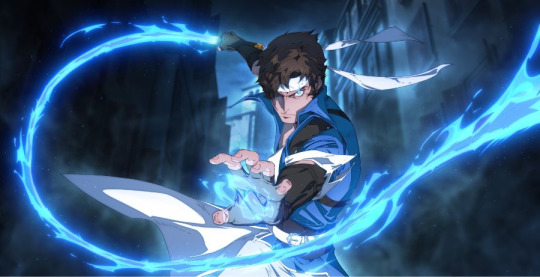
It’s still May, so I’m still going on a Dracula-thon for the month. So, I guess it’s time for some more Castlevania focus!
A while back, I did a list of my Top 15 Castlevania Characters, overall. The problem with that list is that it was actually really, REALLY difficult to sort out the rankings for most of the characters involved, for lots of reasons. One of them is that the Castlevania franchise has gone through so many evolutions over the years, with no less than three separate continuities (more if you count a few of the one-off non-can games), each with its own unique cast of characters, as well as different spins on characters that pop up throughout the series as a whole. I therefore decided it was a good idea to revisit the idea, and simplify things by splitting the concept of the list into two separate, smaller lists: one for the protagonists of the series, and one for its antagonists. This is the former of those lists.
Now, when I say “protagonists,” I’m referring to the MAIN protagonists. I’ll be judging what counts as a main protagonist via the games, since that is where the franchise originated: to qualify for this list, the character must be a playable central character in at least one of the video games. This will not count characters who are just side figures, such as Saint Germain, nor will it count characters who can only be used as playable figures in a special mode, such as Julius Belmont: these two examples, and others, are certainly awesome in their own ways, but they aren’t the characters we really focus on in the Classic games primarily, and are also usually not central figures in other spin-off works.
With that said, there are still quite a lot of characters to choose from. Some of them are Belmonts, some of them are other heroic figures. Some of them wield whips and chains, while others wield swords or magic spells. All of them, however, typically share the same basic goal: to protect the world from the evils of Dracula and his children of the night. I’m keeping this list relatively brief, simply because - after a certain point - all of the characters sort of bunch up together, and it’s hard to keep track of them all and how they would rank. So, with that said, I present to you all my Top 6 Main Protagonists from Castlevania!
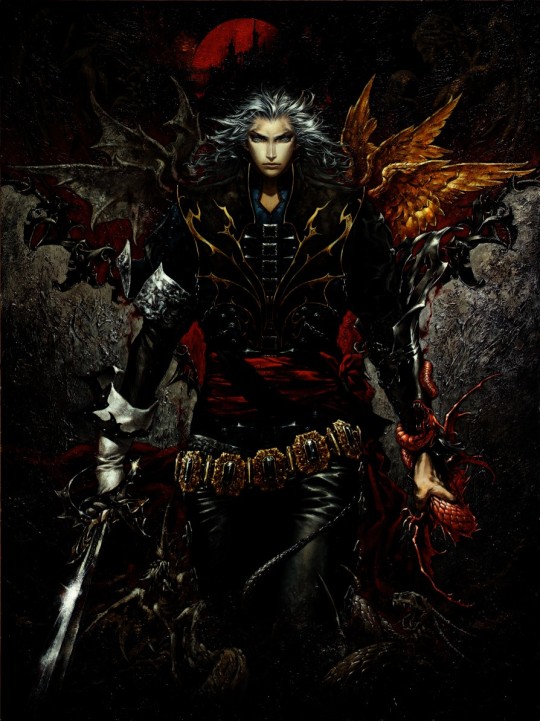
6. Hector.
Hector is the main character in “Curse of Darkness,” one of my favorite 3D-style Castlevania titles. He is a Devil Forgemaster: a human who has the power to summon damned souls from Hell, turning them into monstrous soldiers. Prior to the game, Hector was actually one of Dracula’s war generals: one of the few human servants the undead Count had. However, when Hector felt that the vampire’s bloodthirsty plans to destroy the entire human race had become too much for him to handle, he fled the Castle. This inadvertently helped to allow Trevor Belmont to destroy the Count. Years later, in the events of the game, Hector returns to Castle Dracula, in order to settle a score with his old rival and arch-nemesis: fellow Forgemaster, Isaac, whom Hector blames for the death of his wife. In the process, Hector discovers schemes to bring Dracula back from the grave, and thus must use the powers he once used to help the Count to defeat him before his plans can begin again. I love characters who have redemptive arcs or dark pasts they have to overcome; Hector is a great example of this, as he used to be a villain - one of Dracula’s top agents. This makes the story of his return to the Castle, his quest to stop the monster he once served, all the more interesting. Hector is one of a few characters on this countdown who was later adapted into the animated series; like many of the characters there, this version kept many of the basics of his backstory and appearance intact, but also took some unique liberties. In “Curse of Darkness,” Hector is a stoic and aggressive warrior, prone to following his heart more than his head. In the Animated Series, he’s reimagined as a more reserved, passive-aggressive, scheming character, who has a story arc of growth and maturity. Both versions are excellent and worthy of praise.
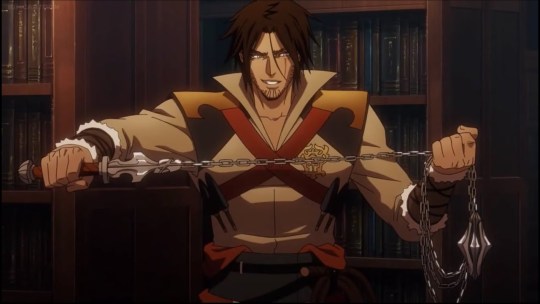
5. Trevor Belmont.
Speaking of the animated series, it’s largely BECAUSE of that continuity that this character makes it onto the list. The Castlevania series - at its core - is the story of two basic, feuding factions: Dracula vs. The Belmont Clan. The Belmonts are a family of monster hunters who have fought with Dracula time after time, across the centuries: every time he is resurrected, a Belmont is usually somewhere trying to send him back to Hell where he belongs. However, in my opinion - and this is going to be VERY controversial for Castlevania fans, I suspect - most of the actual Belmont CHARACTERS aren’t really all that interesting. When Trevor started out, he was no exception: in “Dracula’s Curse,” he is one of four playable characters, and I would argue he is one of the least interesting of the three. What little we know about him makes him pale in comparison to the likes of Alucard, Dracula’s own son with vampiric abilities, or Sypha, a sorceress with various magic spells at her fingertips. (Or even Grant, who is a stab-happy pirate.) This was in the early stages of gaming history, and back then, characters typically weren’t all that well-developed: they were mostly just avatars for the player to use to explore or fight with, and that was basically Trevor’s role. Over the years, however, as the games progressed and evolved, Trevor DID start to develop: more layers were added to his personality and his character. In the Classic games, Trevor became one of the mightiest of the Belmonts: a serious and charismatic warrior who was somewhat jaded by his battles, but could still be reasonable and recognize the good in people around him. But it was with the Animated Series that I feel Trevor really became a fully-rounded character on the whole: the series took those jaded qualities and expanded upon them, as Trevor starts off as a disillusioned soul with a tragic past. Over the course of the series, through facing increasingly bitter and brutal trials, he learns to accept his role and status as a hero. He’s easily my favorite of the "Classic" characters who bear the Belmont name, but since a big portion of that comes from the TV series more than the original games, I didn’t feel I could rank him TOO highly.
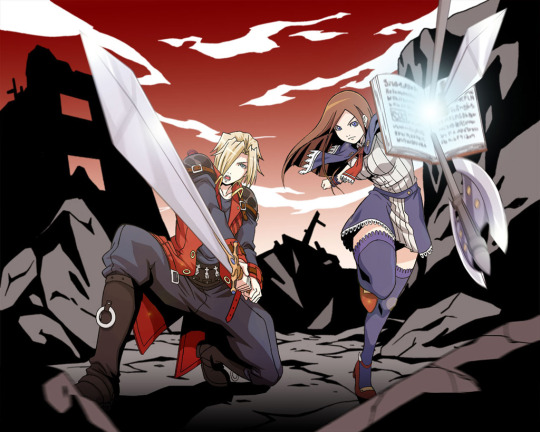
4. Jonathan Morris & Charlotte Aulin.
I was originally JUST going to give this slot to Jonathan, but after consideration, I decided to give both of the main protagonists from “Portrait of Ruin” their fair share of credit. This is largely because so much of what makes “Portrait of Ruin” great comes from the fact it DOES have two main protagonists: the gameplay relies on a sort of buddy system, with various obstacles that can only be overcome by using both characters, and with each character having their own special set of skills. However, not only is this doubling of protagonists important to the gameplay, it’s also an intrinsic part of the story. These two have a sort of “brains and brawn” relationship: Jonathan is the latter half of that equation. He is prone to anger and excitement, always itching for a fight, and tends to use his fists (or his sword, or his whip) before his head. He follows his heart and his instincts before all else, and while sometimes this serves him well, other times it gets him into trouble. Charlotte is the opposite: she is EXTREMELY smart, but also extremely kind and empathetic. However, she’s also much more cautious - sometimes to a fault - and has a habit of rambling and “geeking out” about things, which can sometimes cause problems in its own way. The two balance each other beautifully, both with their contrasting personalities, but also their abilities: Jonathan is very much a straightforward fighter, using melee-focused attacks and bodily force. Charlotte is a brilliant young mage, who uses spells and her wits to solve problems. I should also point out that Jonathan is actually a descendant of Quincey Morris, one of the main characters from the original novel of Dracula, and one of the few American main characters of the franchise: as an American myself, and as a HUGE fan of the Stoker novel, I’ve always appreciated these facts quite a lot. They definitely earn him a soft spot in my heart on their own.
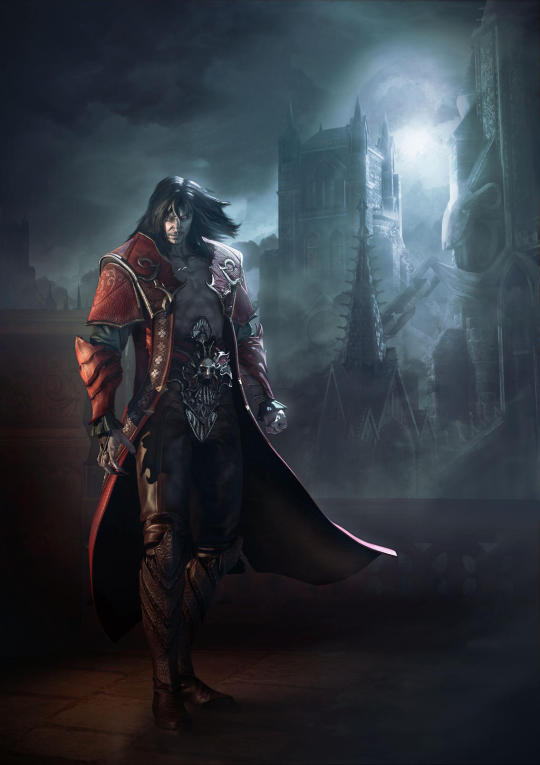
3. Gabriel Belmont, a.k.a. Count Dracula.
Most Castlevania games focus on the main characters fighting Dracula…but what about a game where you play AS Dracula? This was the approach the “Lords of Shadow” series took. LoS was an attempt to reboot the game series, with its own lore and aesthetic approach, inspired by “God of War.” Fans remain mixed about the trilogy of games that came out of this trial, for a lot of reasons. Personally, while I think the reboot trilogy was flawed, I still think it was interesting and had lots of merits all its own…one of them being that instead of Dracula being the main villain of the games, in two out of three titles, Dracula is actually your main character. In the first game, “Lords of Shadow,” you play as Gabriel Belmont: the patriarch of the (weirdly Scottish now) Belmont line. It’s ultimately revealed that, after the tragedies and tribulations that occur for Gabriel in this first game, along with some later misadventures found via DLC story arcs, he actually BECAME Count Dracula. In “Lords of Shadow II,” the player now controls Dracula in full force, as he is resurrected in the present day to face old enemies in a new world. Gabriel/Dracula is the quintessential anti-hero: while he does and has done a lot of terrible things in the games, he’s not depicted as a straightforward villain. Instead, he’s a tortured soul who is struggling to figure out who he really is and what his purpose in the universe should be, and has to deal with inner demons (some literal, as well as figurative) that he cannot fully control. Top it off with the character being voiced by Robert Carlyle, and it’s pretty clear why this was such a fun ride. I know placing this character in the Top Three is going to be another controversial decision, but at the end of the day, getting to play as Mr. Gold as Dracula is all this NEEDED to make my personal highest ranks.
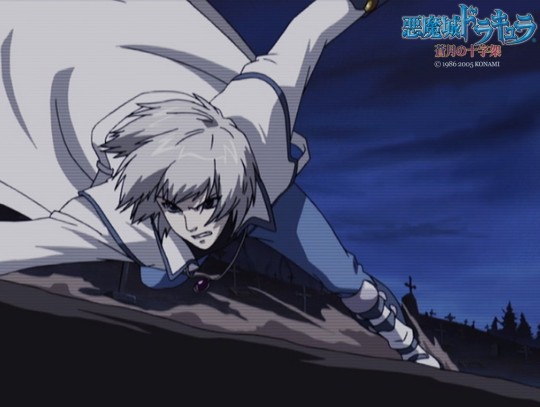
2. Soma Cruz.
As much as I love playing as Dracula in “Lords of Shadow” and its sequel…technically speaking, this character from the Classic era of the games did it first. Soma Cruz is the main character in “Aria of Sorrow” and its sequel, “Dawn of Sorrow.” He is a relatively normal young man from Japan, and is depicted as what might be termed a sort of "nice delinquent." He's ready to fight when it comes down to the wire, and he's not necessarily the most elegant person in the world, but he isn't a bully or a thug. (He also has an AWESOME fashion sense, and seems very proud of that.) He's protective of his friends, tries to help people in trouble, and gets flustered at the attentions of his best friend/love interest, Mina. (Hello, Stoker reference.) However, it’s eventually revealed that Soma has strange powers he never realized before: he’s naturally gifted with weapons he’s never before touched, and has the ability to consume the souls of the enemies he defeats, as well as use magical abilities like it’s second nature. It’s eventually revealed that the reason for all this is a dark one: Soma is actually the reincarnation of Dracula himself, and the Count’s evil spirit essentially lives, dormant, inside his body. If Soma isn’t careful, he could be lost to that inner darkness, and the good person he is will effectively die, with Dracula - memories and powers all intact - being reborn. The games thus become a story of Soma struggling with his own inner darkness, fighting to avoid giving in to temptation and stop himself from becoming Dracula. He has to not only face opponents who want to try and bring the Count back, but also those who would destroy him in a misguided attempt to prevent that from happening. It’s up to the player if Soma succeeds and remains the good, heroic spirit we all care about, or fails and allows himself to become the King of the Vampires. It’s a magnificent concept, which allows for all kinds of fun possibilities in terms of character, story, and gameplay alike. It’s not a surprise that Soma makes the top ranks for many people’s lists of their favorite Castlevania characters, and while he isn’t my personal number one…hey, second place ain’t half bad.
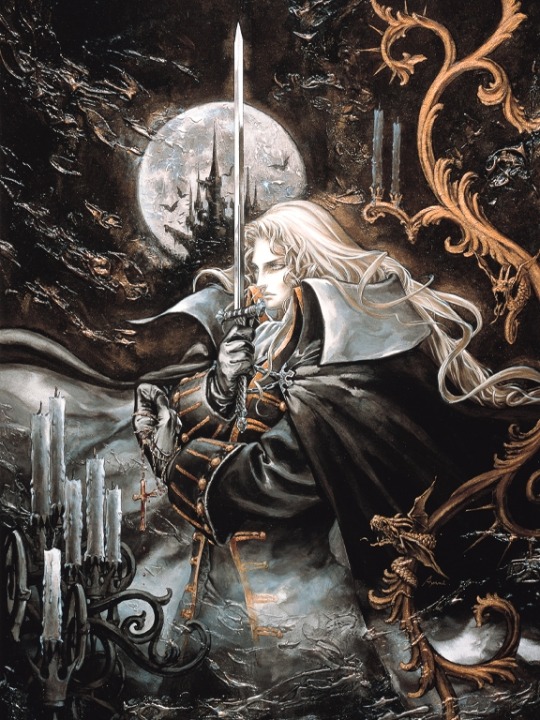
1. Alucard.
Alucard is a character who was automatically interesting from day one, just because of a simple fact: he is the Son of Dracula. The offspring of the main antagonist for the entire series, who has to fight his father to save the world. That is a compelling concept no matter which way you look at it, and since his first appearance in “Dracula’s Curse,” he has only continued to develop and become more interesting. In the Classic series, his shining moment was in “Symphony of the Night” - one of the most lauded Castlevania games, and the beginning of the “Metroidvania” approach to the series. In that game, Alucard is the main character, and the story goes into great detail about the relationship with his family and the reasons he chooses to fight against his own father. In later games, Alucard would continue to pop up, usually as a sort of guide or supporting player for other characters who needed a helping hand (such as Soma, our previous pick). Being as nigh-immortal as Dracula himself, he was just as capable of continuing the battle. In the “Lords of Shadow” series, the character was conflated with Trevor, to fit the new lore of the reboot: in that version, Trevor is Gabriel’s son, and gains the name “Alucard” when his father - not realizing who he is - transforms his son into a vampire, in order to save him from true death. The two start off as enemies, but eventually become allies. Then there’s the Animated Series, which returned to the roots of the Classic games, but took a few interesting twists: after succeeding in destroying his own father, with the help of Trevor and Sypha, Alucard ends up going on some misadventures on his own, as - much like Trevor and many other characters in the series - he is forced to try and figure out where he stands. He has no mother, no father, and is utterly alone in the universe; this causes him to start to lose his way, and it seems like he could potentially end up just as wicked as his father…but eventually, he manages to find the light and prevails as a hero once more. EVERY version of Alucard is great, in my opinion (though I personally think my favorite is the Classic version, overall), because the basic struggle he has to go through is such a simple and compelling one. The rivalry between father and son, and the way their relationship is depicted in each rendition, is ALWAYS fascinating to see, and combining that with Alucard’s rarely-meddled-with design (which is absolutely awesome) and his vampiric capabilities, he instantly becomes an intriguing figure. Alongside Soma, he’s many people’s choice for the best main character in the series, and I am of total agreement there. There’s no doubt he is My Favorite Protagonist from Castlevania.
HONORABLE MENTIONS INCLUDE…
Richter Belmont.
The main character of “Rondo of Blood” (and its remake, “Dracula X Chronicles”), as well as a secondary figure in some other games. Probably my favorite Belmont after Trevor, and for me, personally, the most visually iconic. I should point out I haven't actually watched "Castlevania: Nocturne" yet, so maybe when I get a chance to see that show, Richter might take Hector's place in the top ranks.
Leon Belmont.
In the Classic games, Leon is the progenitor of the Belmont Clan. He appears as the main character in “Lament of Innocence,” the prequel to the entire Castlevania series at that time, which tells the story of how the Belmonts’ feud with Dracula began. “Lament of Innocence” is his only proper appearance to date.
Sypha Belnades.
Much like Trevor, it’s primarily thanks to the Animated Series this character gets into the ranks. We don’t really know much about Sypha in the Classic games, and she is only briefly alluded to in the Lords of Shadow reboot. In the Animated Series, however, she is one of the main protagonists, and is just as interesting as Trevor and Alucard.
#list#countdown#top 6#favorites#best#dracula month#castlevania#heroes#protagonists#video games#animation#tv
9 notes
·
View notes
Text
WAVERLY: “This is your purse. But this is my DNA test. You said it hadn’t arrived yet. Have you opened it? Why wouldn’t you tell me?”
NICOLE: “Because I love you.”
WAVERLY: “Are you serious right now?”
NICOLE: “Because I was trying to protect you.”
WAVERLY: “Or control me.”
NICOLE: “Once you look, you can’t unsee the result.”
WAVERLY: “I don’t need you to make decisions for me, okay? I’m not a child, Nicole. And from the look on your face, I’m not an Earp either.”
NICOLE: “Waverly, wait.”
WAVERLY: “Don’t follow me.”
As much as I hated that Nicole did this, I loved that they had this drama and conflict between them because this is the same kind of thing you would get with a heterosexual couple. Usually the man exerting control over the woman and being the dominant figure in the relationship. Making decisions for the other.
It’s so rare to see this kind of conflict in a queer couple in TV art/entertainment. Especially WLW couples.
While it doesn’t put queer or WLW couples in the best light, it does equalize them to heterosexual couples. Shows that they can be just as toxic and abusive. It’s one of the main reasons why I love Tara and Willow actually despite how much I hate what Willow does.
Creators are so concerned with showing positive representation in queer couples that they actively avoid showing the fights and conflict and drama and abuse when all of that comes with the territory too. And if it’s written well, it can actually help to show positive representation if you play the long game.
Problem is the long game is usually cut short so it doesn’t have the chance to be turned to positive.
That’s what happened with ‘First Kill’. They ended the show with the WLW couple broken up because they didn’t expect an abrupt cancellation after one season.
And as for Tara and Willow… Well, they shot Tara right after they made up. So there was no opportunity to turn that around either. Have them really talk about what went wrong and become stronger because of it.
So besides Xena and Gabrielle, this is actually the first time that I’ve seen a WLW couple play the long game in that they represent the negative moments of the relationship as well as the positive and basically use the negative to evolve the relationship even more into a positive place and the reality of the back and forth.
So I actually really appreciate all this WayHaught drama and conflict that resembles the same kind of situations that you’d see in heterosexual couples. It makes them far more real and relatable because of it.
Creators nowadays are so afraid to do this because of representation anxiety and cancellation anxiety. They don’t want the last moments of the show to end on a sour note for the queer couple and face the backlash. It’s understandable because it can happen out of the blue that a show just gets axed like that before the creators have any time to properly conclude the arc.
So I never blame the creators when this happens. Only the network/streaming service because they couldn’t care a less what story arcs in the show are and aren’t concluded and what characters and their relationships to each other and developments are cut short. So if they end off a queer or WLW couple in a bad place - it’s really just as awful for the creators as it is the fans.
The creator of ‘Wynonna Earp’ promised the fans a happy ending for WayHaught and she delivered because she had an early enough notice about a possible cancellation in Season 4 and therefore could provide a proper and satisfying conclusion for every story arc, every character and ever relationship.
Most creators do not ever get that chance because they are never told by the network early enough.
Queer couples do not get the long game. But believe me - 99% of creators want it just as bad as we do.
#wynonna earp#wayhaught#waverly earp#dominique provost chalkley#nicole haught#katherine barrell#drama#conflict#conclusion#cancellation#representation#creators#queer representation#wlw representation
7 notes
·
View notes
Note
Hi! I wanted to say I LOVE your fic, and how you characterise the ninja - they’re so realistic in how they act and they have such unique ways of thinking! I also love the way they all interact with one another - the shenanigans never fail to make me laugh. I’m trying to write something myself atm, and I was wondering if you have any tips on how to do consistent characterisation/character arcs? It’s something I struggle with lots and I think you do it really well! Tysm
Thank you!!
I've gone into a few details on my approach to writing overall right here, but for specifics relating to your question:
Characterization:
Revisit the source material often! It can be easy to forget some of the more nuanced aspects of a character the longer you go without directly experiencing it (and being influenced by ~fanon~ which is not always a bad thing), but that right there is the foundation for consistency and for finding ways to expand on the character too!
A few examples of things to pay attention to when doing so are a character's dialogue/infliction (what phrases they say, how they say things, etc), how they react in average situations vs extreme ones vs personal ones, the ways they act/stand/look when not saying anything or aren't the focus, or trying to imagine what might be going through their heads, whether they're speaking or not!
Plus, it can even serve just as a quick refresher! Even I still go back and do that once it a while, especially when I need to figure out how to write a fresh character's voice (totally not as an excuse to rewatch ninja pfft what)
Read fanfiction! Yes, I know I just said we can get a little too buried in ~fanon~ sometimes, but something that can help your understanding of a character is to study how other people understand a character! Maybe they do things with Kai you agree with! Maybe they handle Cole in a way you disagree with! Either way, that does help sort out what you want to do when you write, and help you come up with idea you might not have considered otherwise!
It can also help you with the "filling in the blanks", for stuff like character dynamics for people that haven't ever spoken/interacted at all, or how a character would react in a situation they've never been forced into in canon and you're not sure where'd you start with it otherwise. If nothing else, it gives you a nice place to jump off from! And something to talk about with other fellow writers!
I just personally think it's important to remember a character's base foundation before pushing them outside of their establish box—bending without breaking, so to speak
Character Arcs:
Sometimes development can happened within a single chapter. Sometimes it's something that is contested across the entire story! One of the first things to determine is how big of an impact a character's arc is going to have on the overall plot. Is their development the plot itself? It is developing at the same time as the plot, or because of it? Is it something that happens on the side but works in service to the plot? Or does it happen independent of the plot entirely?
After asking these questions, you can then determine how important the character arc is going to be, and from there sort out how much focus you want/need to put into it. Does it all happen throughout the story as whole, just when the timing is right, or do they get a subplot dedicated to it? Those types of questions can help you decide how you want this development to unfold too.
The way I generally do it (primarily in my rewrite) is to block out the main events of the overall plot, and then detail where each character would be at in their growth corresponding to the event and/or the point in time, that way I can pace things a little easier, and figure out how potential changes can/will ripple effect down the line. Of course, this may not work for everyone or for every story, but it could be something to try!
Always!! Write!! It!! Down!! Maybe you've got it so well planted in your head and you'll only ever glance at it once, or maybe you'll make a bunch of changes to it in the future, but write out your overall plan(s) for the character(s) at least once, and then go from there. It's just good to have for a reference, and having it all in front fo you can help you visualize some of the finer details down the line (since you don't have to waste brain power constantly recalling the order of events or whatever—you can start digging deeper into the fun stuff!)
Remember it's okay if a character is static too! Depending on the plot/setting, there's going to be characters more situated for the plot at hand than others, and it's okay if everyone isn't going through something at the same time. A character might not need to undergo some astounding personal revelation; but whatever they can contribute can still be important!
So, if some of your struggle is that you can't figure something out for a character to do/learn, it's okay to put them in the backseat until they are needed, or give them smaller, less dramatic goals to overcome! That way there's not as much pressure to cram everyone into the spotlight, and gives you more breathing room to write their moments more naturally, rather than forcing something that might not even be necessary!
Anyway, hope that helps somewhat! ^-^)/
39 notes
·
View notes
Note
So I'm guessing both sasuke retsuden and boruto were flops during sales. But I don't understand why boruto fans are happy about selling more than retsuden. Selling roughly about 34,000 isn't a good thing. Especially when it comes to the naruto franchise. That's actually pretty bad all things considered. One thing I notice ,that the hate they have for retsuden isn't because of the story or sasuke, it's because of sakura. Sakura contributed a lot to the plot, had a new sensory jutsu and figured out the main conflict . On top of that, sasuke gave her a ring and was loving and caring and supportive. From what I've noticed, Naruto fans expected Sakura to be miserable in her marriage to sasuke, because she rejected the " nIcE gUy " naruto. According to that philosophy, the woman needs to be miserable because she didn't choose right, but instead, it's blowing up in their faces. Sakura isn't miserable. She isn't a failure. She isn't regretting her marriage. She's happy and content with her marriage and job.
So I'm guessing both Sasuke Retsuden and Boruto were flops during sales.
I don't think you should compare them much. Boruto is a established sequel of Naruto made by some of Masashi Kishimoto's assistants and with years of serialization and an anime; Sasuke Retsuden is a spin-off of Naruto written and illustrated by a different people unrelated to Masashi Kishimoto, and the setting of the novel doesn't fit the timeline of Boruto. They're very different.
I've seen Boruto's sales and they have dropped dramatically since it began, but I've also seen that Sasuke Retsuden printed less copies and they didn't reach every store. I don't have a say in that, but I don't think that Sasuke Retsuden should be considered a flop.
I don't understand why Boruto fans are happy about selling more than Retsuden.
They're gonna compare it to Sasuke Retsuden because they can't compare it to other shounens. Boruto isn't half as successful as Chainsaw Man, Dragon Ball Super, Jujutsu Kaisen, etc.
They're comparing the sales because it's the only thing they managed to surpass, because in online platforms Sasuke Retsuden has been ahead since the beginning despite being roughly 3 months old while Boruto started in 2017.
The hate they have for Retsuden isn't because of the story or Sasuke, it's because of Sakura. [...]
Sakura slander is very easy and that's why it would be directed that way, especially coming from Boruto's fanbase who are defending their manga from hate daily.
Although I've seen reactions to the dinosaurs more than to Sakura's role in the manga. People complain about dinosaurs but refuse to read why there are dinosaurs in the first place, and they think it's the weirdest thing in the world when Naruto and Boruto deal with aliens, cyborgs and deities.
Sakura does take a great role in this novel, from creating her own sensing technique, to showing off Fire Release and expanding her jutsu arsenal with her own barrier-type ninjutsu; she demonstrated to be the same book smart intelligent kunoichi she always was and se was putting it to use to develop in success. I guess some people might be mad that they can't say Sakura was doing nothing or whatever.
She was doing a mission with her husband in a place that made him open his eyes about the nature of his marriage, so completing such a task with your partner has romantic moments. It also helps clarify one last time (for those viewers that refuse to accept it) that Sasuke and Sakura love each other despite working different jobs in different places.
Other than that, if Boruto is getting hate isn't because of Sasuke Retsuden, it's because it's bad. They think that after a whole year of fillers, long periods of time with episodes of random filler characters dying week after week for some new generation character development "Land of the Waves retcon" that the manga is unable to do, tea parties, school adventures that contributed to nothing in plot and a Squid Game copypasta arc; all that mixed with bottom tier animation, isn't the reason for the hate but Sasuke Retsuden is.
And I can't help but laugh because Sasuke is one of the most popular character in Boruto and having him around guarantees views.
Sasuke Retsuden is getting the anime some attention after the fillers, but if it gets bad reactions it's because of the bad animation. The hate is directed towards the animation like it has always happened, not to dinosaurs or shipping exclusively.
41 notes
·
View notes
Note
I want to write my own fics and I was wondering, how do you plot and outline yours so well? Your fics are amazing and everything flows so well, the scenes have never felt out of place or disjointed when I read
It's the outlining, I do rather a lot of it.
Here is an absurdly detailed post I made a few years ago about how I outline: the outlining post (if the formatting of the images appears cut off, try clicking on the images for the full text)
Basically, as you will read, I start with a general outline for the whole fic, then break it down into arcs, then break it down chapter by chapter with which scenes I think should be in each chapter.
Some things that really really help though: I cannot recommend making motivation maps for your characters highly enough. Literally, make a list of all of your main characters, and then try to figure out what each character WANTS and what they are willing to do to get it. Do this whenever anything big happens in the fic that "changes things." A lot of really great drama and tension in a story can come about simply by having two characters wanting different things, but often, I have only realized that any tension even existed because I sat down and worked on some motivation maps.
Fanfic is different from other forms of storytelling in that it is serial; you are going chapter by chapter. The good news is that you don't necessarily have to have everything perfectly figured out before writing. There would be no fun in that, and the thing about hobby writing is that we thrive on comments to help keep us motivated and excited!
So, here is my advice: 1) give yourself wiggle room. especially if you are not sure "what happens next" or what the fine details are of an intricate plot point. if you want to publish a chapter but you don't have all of the details figured out, don't mention the details! you could have your pov character acting as the detective trying to figure out a conspiracy happening around them, and asking themselves questions (that are great questions you as the author may or may not even know the answer to!). you could have the characters speak about a plan without detailing what that plan is, exactly, only that it is sure to be dangerous and thrilling, and then leave the audience in suspense of what the actual plan entails until you are ready to write it out (ie until you, the author, have figured out what the plan is!) You could have your pov character aware that others around them are keeping secrets from them, or have them find out information later. there are lots of ways to publish and enjoy writing while sort of shelving plotting problems for later. (For example, in FE: when Elena finds the vervain in her duffel bag before going to New Orleans for the first time, she spends a lot of time wondering who on Earth put the vervain there and freaking out and obsessing over the possible motives for giving it to her. I actually didn't know at the time who had put the vervain there either. I initially thought it was probably Stefan. I knew it wasn't Klaus, probably not Rebekah. But I kept that question open until I had time to mull it over and conclude it must have been Tyler.)
2) reread your work!! this is especially important for longer projects-- but, you will probably find that you have dropped unintentional gems into your writing in passing-- details that you can incorporate into larger themes and plot points, which can then become a sort of "foreshadowing." (Back to Elena and the vervain: it was on rereading the earlier chapters of FE that I realized that Tyler and Elena had had that whole conversation about hanging out together and looking out for each other, that I had written that scene where Tyler swears he's going to protect Elena and she doesn't even believe him, and that it would be reasonable for Tyler to guess Elena had a diary/that she might keep it under her floorboards because that's where he would keep it/we know in canon that Tyler thinks to look in places like that from when he found the moonstone-- so Tyler got pinned down as the vervain benefactor like 6 chapters after the fact from doing a reread)
I hope some of this helps and it's not a total jumble. Good luck writing! Enjoy yourself.
9 notes
·
View notes
Text
I was enabled. And somehow this wound up 1700 words long. And it’s still not everything I want to say.
So I have personally been making my way through several Transformers shows over the last few months and sort of doing writeups. Long story short it's a love/hate relationship. But my most recent one was EarthSpark, a show which was a lot weaker than I'd hoped. But in the middle of watching that show I figured "well Rise of the Teenage Mutant Ninja Turtles is also on Paramount+. It might be fun to try out the other recent take on an 80's cartoon." And then the show was so much better I almost got angry.
Now, admittedly the shows are not THAT similar, but they are both about groups of non-human characters trying to get by on Earth with the help of human friends, they are both somewhat fresh takes on an 80's classic and they both have family as a central theme. And Rise just works so much better as a show.
Now there are a couple of reasons. For one I think the split-episode structure keeps the Turtles episodes flowing at a really brisk pace, and the far more episodic structure allows for more freedom, while EarthSpark feels more like it's trying to tell one story that keeps getting broken up. Rise also just has stronger writing. But I think the main issue for the difference in quality is just that Rise, unlike EarthSpark, knows what it wants to be.
And what exactly I mean by that is hard to pin down. A lot of it just comes down to how something ~feels~ and that's not very helpful. But I think it mostly comes down to two things. Clarity of Theme and Consistency of Tone.
-
Clarity of Theme
Stories have themes. They just do. Themes are what a story is about.
So what is EarthSpark about. Well. The two main themes I've seen people mentioning are Family and Identity. Which are definitely major themes! Don't get me wrong, the show is pretty blatant with them. But those are far from the only themes. We also have things like second chances, racism/xenophobia (handled really poorly in my opinion), growing up (which I would argue overlaps with identity but is still it's own thing) and the fallout of a war. None of these are bad themes inherently! But trying to tackle all of them in one 26 episode season means you can't go into much depth with any of them, so all the lessons come off as pretty shallow with kids just kind of being told what to think about the situation. There are also a few laboured political points (and before you jump me NO. I am not talking about Nightshade. A nonbinary character existing is not political. I'm talking about shit like the "undocumented cybertronians" line that make me want to drown the writers in a kiddie pool.)
Overall it feels like the MAIN concept behind the show is using Transformers as a second-generation immigrant story allegory. Which I actually think is a neat idea! But so much else is going on the concept has no real space to breathe.
And what is Rise's main theme? Family …and that's about it! Yeah there's the episodic morals and such but the over-arcing theme really is just family. Largely brought about just by how the brothers and Splinter interact. You just buy them as a family because of how they interact. They love each other, they get on each other's nerves, they support each other, they argue. You can see Splinter becoming more involved as an actual father as the show goes on. Everyone gets through the trials because they go through them together.
And of course, how the villains tie into this. Now most of the villains in Rise are just there to be silly obstacles, but one does stand out, and that's Shredder. In this version, Shredder is a demonic set of armour and the corrupted soul of Karai's father. His defeat means the two can finally reunite. And his long reach and the feud between the Hamato and Foot clans all tie into the theme of family well. His defeat ties every character together and emphasizes the theme.
Krang is the movie villain, and they made him terrifying by the way, and he ties more into the movie's theme. It's a more character-centric arc of Leo being humbled. Learning he needs to give his ego a break and help and be helped by his brothers. Since Krang is all about personal strength it sets him as a fitting foil, ready to be brought down by self-sacrifice and further humiliated by people working together.
Heck even Draxum ties into the theme. He is technically one of the Turtle's parents and is the reason they and Splinter ever became a family. It all ties into the theme.
So what about the villains of EarthSpark?
Well you have Croft, who is meant to represent the institutional xenophobia aspect. She does not like the robots even as she works with them and wants to get rid of them. Fine. Though it is frustrating that there's things she's not really wrong about, but she's clearly meant to be entirely evil. But sometimes that just happens. The bigger problem is she has no real impact on anything. There's no showdown with her, she just dies (maybe???) to try and up stakes. Also they called her Karen. You can't tell me it wasn't intentional and I HATE it.
And Mandroid! Who… well he doesn't like the robots because he lost an arm in one of their battles? I think? But he also sort of wants to become one? And that ends up driving him insane as he gets really sick? And he's just kind of a dick. …Look Mandroid is just a garbage villain who doesn't really tie into ANY of the themes and that sucks. You could argue he represents hate. On a deeper level you could argue he represents a perversion of the Transformer/Human cooperation dynamic. Or that his portrayal is just kind of ableist. But he just kind of wants to kill robots because he's angry at them, and is very boring.
-
Consistency of Tone
And here's where it doubles down on how it feels, since tone can be harder to pin down. But I'll try.
Rise is fully committed to being utterly absurd. It embraces the stupidity of its own concept and sets about building a setting nominally our own world but honestly nothing like it. Its action is completely over the top. Its villains are rarely taken seriously and their general mayhem blends with the mayhem of the world. No concept too ridiculous, we are in a world with teenage mutant ninja turtles after all! The final episode of season 1 has a sixteen year old girl whack a baseball at a toy left in the head of an ancient evil that a rat had been using as a teapot. And the rest of the series set up the world so that I was 100% willing to buy that.
It also helps with the more ridiculous plot points. Baron Draxum getting forcibly adopted into the family after his defeat is stupid. But the tone of the show makes it work, he's just another silly character silly things happen to. And again, it ties into the themes of family. The tone helps it flow better than say, Starscream or Shockwave's random changes of heart in EarthSpark which are played more seriously and with characters who have little to no build up.
Really the only times Rise stops being silly are the season 2 finale and the movie. Which are still kind of absurd but much darker in tone. And honestly by that point? The show had earned it. I care about these goofs and their world. Seeing all that in genuine peril felt awful.
EarthSpark's tone is a little harder to pin down. What it seems to be going for is a deeply idyllic feel that gets shattered by the darker things in the world when they show up. Which is fine, it could work really well! But, likely in part because of the way it released in batches, the darker points largely seem to come out of nowhere and then things go back to idyllic until the next batch opener or finale. Now on a more personal note, idyllic crosses over fast into cloying for me and a LOT of the show crossed over and never looked back. The attempt at a somewhat more serious tone also makes the goofier moments feel out of place.
I do think in large part it's the execution. If you want to have a tone that keeps swapping you want to balance it better. If you want a tone to shift once you have to earn it. And I think the balance was off.
-
Nostalgia Factor
One other note is harder for me to write about because Rise is the only TMNT show I have watched. So any appeal to the nostalgia factor here would be lost on me. Aside from maybe noticing that the two main Foot Clan members were voiced by Pinky and The Brain. (Side note: The more I look at the cast the more I hope the casting director got paid well) Which means I am kind of biased here. But I will say I know most of the villains were new characters the creators made to mess around with. And they are very fun.
Because ES really needed to ease up on the nostalgia. I think part of its problem is being unwilling to let go of the past, to focus entirely on the new cast rather than hyping up legacy characters. If you wanted to write a story about them, then do that! Again, I have no doubt this show was written by fans. What I doubt is whether that's a good thing in this case.
-
P.S. Rise also has significantly better animation. One of the things I did quite like about ES is the action sequences, but Rise completely blew it out of the water with theirs. And stylisation helped make even the simple scenes feel more energetic. Am I saying that Transformers should go back to 2D animation? YES.
#TFES#ROTTMNT#Frare watches the silly robot show#More or less#I barely proofread this I’m sorry#Earthspark#I am mean#Frare’s Transformers writeups
2 notes
·
View notes
Text
I have no backing for this but I feel like every post about KH I’ve been making lately has been very negative??? Idk I reblogged a post today and realized it was really really negative? And like. I don’t like KH3. I stand by that. And it’s because I fucking love this series. I love it’s characters. I love how much of a madman Nomura is.
But. I can also feel the lack of love that went into KH3. That’s not to say there wasn’t any love. The world designs are phenomenal (did you know they modeled a specific city block in San Francisco for San Fransokyo’s level? I need to post that comparison soon). The gameplay, while too flashy and breaking the flow of gameplay constantly, looks really good. The game looks good. It feels good to play. I hate the game yet it’s my most replayed KH game to date.
Yet I can’t help but feel like Nomura was tired when writing it. He was tired of these characters. Tired of this arc. He wanted to move on. I don’t blame him. He’s been working on the Xehanort arc for around a decade. Damn, I would be tired too. But it’s a problem when I can feel that tiredness in the story.
And it permeates the story. The sequel-baiting. The bringing up things out of left field. Fucking Verum Rex. It’s just. KH3 feels tired. It feels tired of its own IP. It feels tired of the arc it’s supposed to be ending. It feels tired of Disney and Sora and the characters we’ve been following for years.
Idk, I mostly just feel disappointed about KH3. At this point, I’m just tired of it. I loathe the game because I love the series and I hate how lackluster of an ending KH3 got because Nomura got tired/wants to do other things with the series (*side eyes the hideous rebrand of Versus XIII as Verum Rex*). This series is near and dear to my heart and it’s just sad. When the game came out, I felt betrayed. There was too much coming out of left field. Too much focusing on what was ahead instead of closing off arcs. It was too little too late.
We waited thirteen years—and for what? For Sora to be sent left and right with no direction across 6 Disney worlds? For everything to be wrapped up in a nice little bow with little to no struggle or emotional agony that all of the previous games have consistently given us? For Sora to just be able to fix things with no consequences? For every world Sora was sent to to feel inconsequential (and I can see the effort there. I can see so, so much effort to make something. Each movie featured has themes of loss and sacrifice but it’s just not there in KH3)? For Sora to not even take a front-seat in most of the story? He’s just there, a vessel for the player to watch events that he has nothing to do with unfold? What happened to Sora, the main character? Why does no one want to involve him on anything? Now he’s just the dues ex machine all the important people get to call when they get in trouble. Where’s the setup? Where’s the payoff? Where’s the hours of Lea agonizing over Roxas and Xion? Where’s Aqua and Ven trying desperately to save Terra, knowing he might be too far gone? Where’s Sora, facing up against the biggest foe of his life, who’s supposed to be the most conniving, deceitful man ever? It all just gets shoved to the end, barely mattering outside of a single world.
The worst part is—I know Nomura can write something good. I know he can do the setup and payoff. He explained why Mickey was shirtless in KH1 for Pete’s sake! He did really good at Union X’s story and making us really care about the new characters we have never met! He made impeccable Disney Worlds in Dark Road that had plot relevance! I know he can make something good, great even! So why didn’t he with KH3?
Sorry for the long post. Figured I’d explain some of my disappointment in KH3. I really do love the series, and it’s what makes KH3 so disappointing and bad to me. I know this is a 5-year old conversation but I’d figured I’d put my 2 cents into the pot.
#kingdom hearts 3#not kh3 friendly#collectors thoughts#not linked universe#I’m feeling chatty today I guess#I love kingdom hearts#but it’s been feeling bitter lately
2 notes
·
View notes
Text
FROZEN THE MUSICAL // F1 & F2 (+ theories about F3): Why Colder By The Minute is a very important song.
youtube
"Colder By The Minute" is one of my favourite songs from Frozen The Musical, not only because it's the climax of the story in song-form, but also how the couple Kristen & Bobby Lopez came to realize how this whole situation works as two parallel duets:
"And the other thing we realized, that really helped us, [...] was that we realized that it was two duets: it was Anna and Kristoff, and it was Elsa and Hans, in a duet. Once we realized that, and those were the pairs we were trying to connect, then we were able to put the puzzle piece together in Bobby's computer, bit by bit."
Kristen Anderson-Lopez (Colder By The Minute - Commentary)
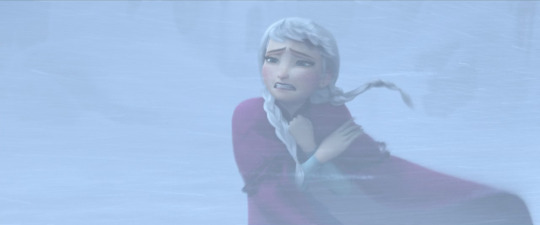


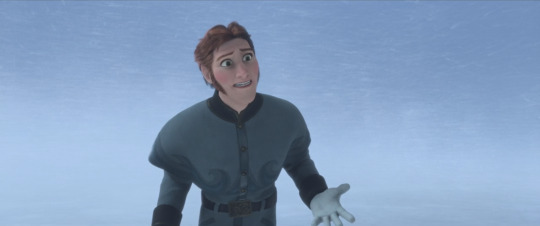
After the ensamble (rappresenting the snow storm), we have Anna, and then Elsa, taking the center of the stage and singing their lyrics, while Kristoff and Hans sing respectively as the "other-half" of these duets.
For me, this song is amazing because it reflects pefectly that "narrative balance" in Anna & Elsa arcs that the Musical manages to do, compared to the movie, which's mainly Anna's story (but this is for obvious reasons: more time, more songs etc etc). What the Musical enforces even better is Kristoff & Hans role, with their arcs becoming, the more time passes, perfectly parallel to those of Anna & Elsa.

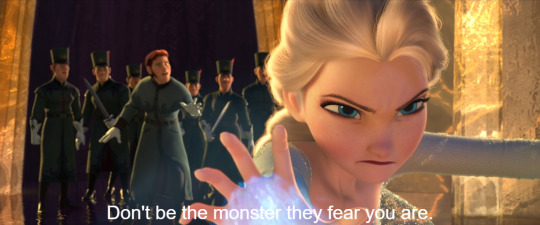
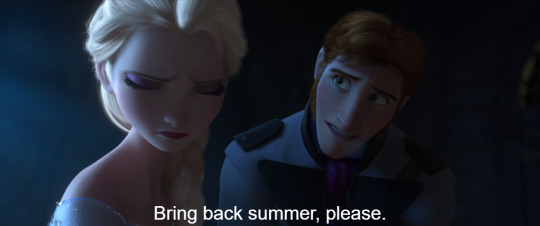

"Colder By The Minute" summs up this narration, showing how insecure and desperate these two girls are, "supported" in opposite ways by these two male characters (Kristoff out of his genuine love/Hans out of his lust for power), who are much more experienced with the outside world.
As we know, the sisters will disprove these "fairy-tale archetypes", each one solving their own issues themselves, thanks to each other, with Anna performing the act of true love by sacrifying herself to save Elsa, and Elsa finding the way to control her powers and freeing Arendelle from the Eternal Winter, all thanks to Anna's proof that she deserves love:
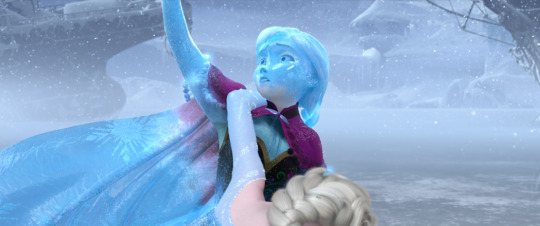
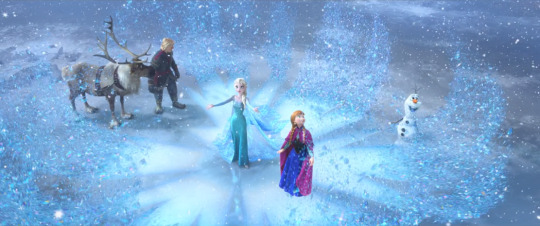
Frozen 2 gives me the idea that, working on the Musical in general (this song afterall it's the climax), than the next step was for Anna & Elsa to follow a even clear parallel path, something that would focus entirely on THEM as individuals, making their own choices, rediscovering their own family heritage, under the more self-defining concept of "destiny":
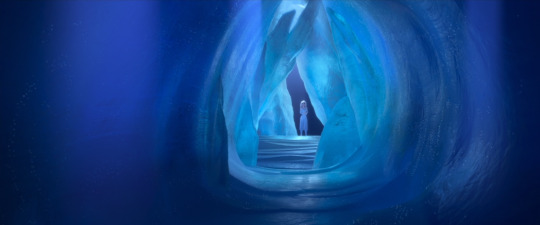
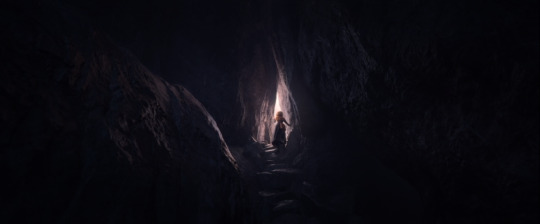

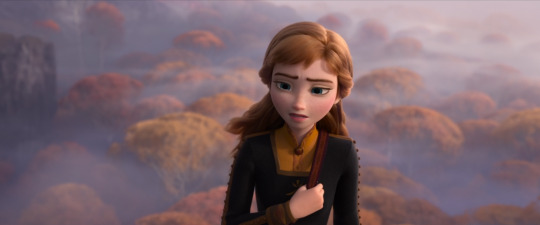
In a way, I see the two sisters following "under a different light" the paths that Kristoff and Hans took in the 1st movie, with Anna facing the changes that are coming in her life and choosing to do what is right despite the cost (just like Kristoff chose to lose her forever to ensure her safety ) and Elsa searching for her true self, risking to cross a "determined line" for her own good (just like Hans schemed in order to plan her demise and take the throne).
The resolution shows then Elsa saving Arendelle from the tidalwave, helped by Nokk and being granted with the full power of Ahtohallan, thanks to Anna freeing the Enchanted Forest from its curse by destroying King Runeard's Dam, also thanks to the help of Kristoff and Lieutenant Mattias:


This is why my main clue in case of a Frozen 3 lies in the sisters "Balance", and in the idea that Kristoff & Hans can be the key to a new story now that our two protagonists have found their "roles in the world", going through a common journey where they both hold the responsability of this whole situation, of course in opposite ways, but it was truely about THEM (the sister central discussion happens in front of the remains of their own parents ship):
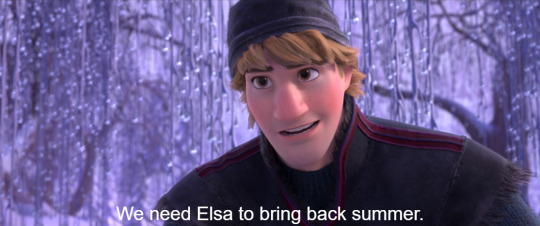



While Kristoff & Hans were the "experienced figures" in F1, Anna & Elsa are now the two "in charge" of this new status quo thanks to F2.
Even if less impactful, Kristoff has an arc, an evolution where we can see him letting some of his "inner-walls" down and finally express his feelings more openly, after a life-time used to be a nobody, living in the woods with only Sven and the Trolls giving him company, and now he's engaged to the Queen of Arendelle herself, that would clearly put him more under the spot light. Hans is not present, but it's clear that the "13th son of a king" everyone was looking at has now become a complete nobody, mocked and deprised, and with none caring about what was of him even after 3 years from his terrible actions.
Even if it's not as explicit as someone would expect (or hope for), there's actually a very strong, thin line of potential that the best way to handle Anna & Elsa status quo, to subvert things, and not losing the "Two world dynamic", may come from the only two other main human characters that actually had great importance in shaping their own present when they were struggling with their own past.

After all, Anna's relationship with Kristoff and their engagment resonates with the love of her own parents, which is now a symbol of the unity with the Northuldra, a new path she is leading Arendelle through, and Elsa's role as the Fifth Spirit is to connects the magic of nature and humanity, bringing balance through her powers and protecting the Enchanted Forest from threats like their own grandfather was:


Maybe I'm wrong ... but the logic seems to add up pretty well, considering what direction they took Frozen 2 on, how it parallels with F1 and how much the Musical was important in its development. The characters on a path that was meant to view the 1st Frozen itself under a different light, so that could be the next step in order to carry on certain themes and concepts, which doesn't mean we wouldn't get new things.
#Frozen#Frozen 2#Frozen 3#Frozen The Musical#Anna#Elsa#Snow Sisters#Kristoff#Hans#Colder By The Minute#Olaf#Sven#Arendelle#Enchanted Forest#North Mountain#Ahthoallan#King Agnarr#Queen Iduna#Northuldra
27 notes
·
View notes